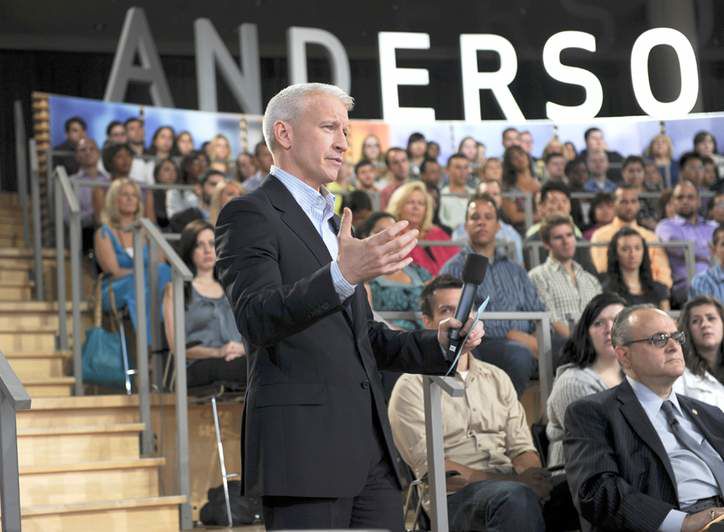A big twist in career, but not quite a 360
Published 5:00 am Monday, September 19, 2011

- Anderson Cooper hosts his new daytime talk show “Anderson,” which will address entertainment topics not likely to be seen on his CNN program.
“Anderson,” a new syndicated daytime talk show, has been on only a week, and viewers already know more about Anderson Cooper than they’ve learned in the decade he has spent as a CNN anchor and correspondent.
Cooper is opening up about everything, almost.
Tonight he plans to show an interview with his famous mother, the exquisitely preserved Gloria Vanderbilt, 87. In it they go over her tragedy-filled youth, and his. Cooper chokes up as they discuss his brother’s suicide in 1988. He and his mother hold hands while a family friend, Judy Collins, takes the stage to sing “Amazing Grace.”
Last week Cooper confided that he went on vacation in Colombia recently with a friend who had just come out of rehab, but he didn’t name the friend. He did, however, show photographs of himself, bare-chested and plastered with goop from a volcano mud bath near Cartagena.
Cooper got a spray tan with Snooki of “Jersey Shore,” mugged side by side with his wax likeness from Madame Tussauds, and compared childhoods with Sarah Jessica Parker. (When he was 11 his mother took him to Studio 54 — with Michael Jackson.)
He invited the comedian Kathy Griffin and a camera crew for a weekend at his summer house in the Hamptons. He and his high-maintenance guest romped in his bed and poolside; she complained that he didn’t have servants. Cooper said he liked it like that but didn’t explain who looks after his dog, Molly, when he goes off on assignment.
The one thing he hasn’t done yet — and the lacuna grows more obvious and awkward with each show — is talk about his love life. It’s hard to see how he can continue to leave that out selectively and preserve one particular zone of privacy while building a confessional talk show wrapped around his good looks, high spirits and glamorous adventures.
Cooper still covers news on “Anderson Cooper 360” on CNN, but he clearly hopes to fill a vacuum left by the end of “The Oprah Winfrey Show,” because he has pulled out all the stops to embrace daytime television’s loosey-goosey ethos, perhaps trying to stake out his territory before Katie Couric starts her talk show on ABC next year. Last week Cooper commiserated with the family of Amy Winehouse; on Friday he spoke to some of the cast of “The Real Housewives of Beverly Hills” about the suicide of Taylor Armstrong’s estranged husband, Russell. (Taylor Armstrong did not participate.)
And it is remarkable, given his hard-news background, how quickly Cooper has adapted to the format and his fancy, light-filled set overlooking Columbus Circle. In the intro Cooper glides through New York on his bike, no helmet, waving at cab drivers. Onstage he jokes with movie stars, comforts guests and strolls with his microphone into the studio audience, sharing his feelings.
Cooper isn’t as effusive and emotive as Winfrey or as funny as Ellen DeGeneres. If anything, he is like another silver-haired talk show host of yore, Phil Donahue: friendly, earnest but willing to be playful.
Anderson was born into the beau monde and got out of it, spending his youth in war zones and disaster areas where privilege and pedigree are not assets. He never entirely shed his celebrity gloss, however, posing for the covers of Vanity Fair and Men’s Journal, among other publications. Even in disaster zones, Cooper is known for wearing tight black T-shirts and inserting himself into a story, most memorably during Hurricane Katrina, when he assailed public officials for not doing enough to help victims.
Gossip magazines like Us and People, and websites like TMZ .com, follow his exploits, but he has so far managed to avoid mainstream prying. As he put it in a 2007 interview, “The whole thing about being a reporter is that you’re supposed to be an observer and to be able to adapt with any group you’re in, and I don’t want to do anything that threatens that.”
The whole thing about being a talk show host is that you stop observing and make a spectacle of yourself, and that usually entails losing control over what you disclose and what you hold back. “Anderson” raises the question of whether Anderson is quite ready for that, and its success may hinge on the answer.






